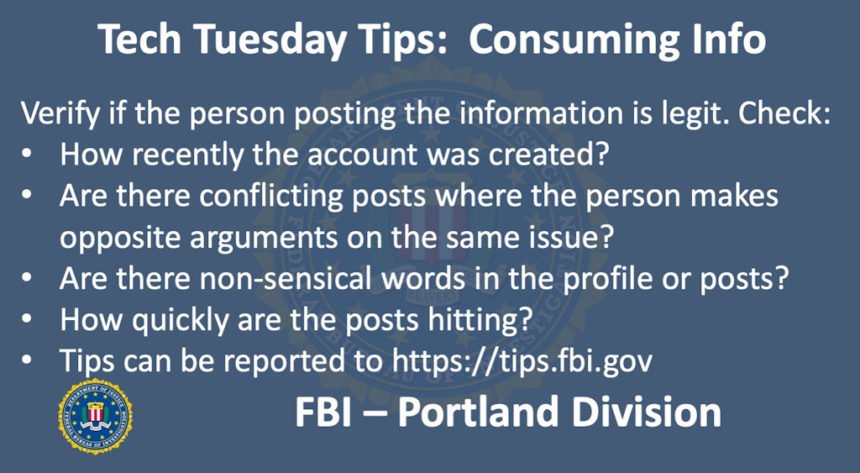Oregon FBI’s Tech Tuesday: A digital defense on how you consume info

PORTLAND, Ore. (KTVZ) -- The FBI has launched the “Protected Voices” initiative to help 2020 political campaigns and American voters protect against online foreign influence operations and cyber security threats. The Protected Voices campaign includes information and guidance from the FBI, the Department of Homeland Security and the Office of the Director of National Intelligence.
This FBI Portland Tech Tuesday report is adapted from the Protected Voices initiative, with a focus on providing cyber security information to political campaigns as well as businesses and individuals in Oregon. More information on all aspects of the initiative, including video downloads, can be found at www.FBI.gov/ProtectedVoices.
Welcome to the Oregon FBI’s Tech Tuesday segment. This week: building a digital defense relative to how you consume information.
When you find information on the internet, it’s important to remember that the creator likely had a purpose in writing that post. Things are often put online to a) make money or b) to influence the viewer’s perceptions of an issue or problem.
It’s really important to consider the source of the information. Who posted this material online, and why? You should start by checking the profile of whomever appears to be posting the information. Do a search to see if the poster is a real person and what their qualifications may be. Specifically, look for:
- How recently the account was created?
- Whether there are conflicting posts (such as the person supports an issue in one post, but is against it in another)?
- Whether there are non-sensical posts or profile info doesn’t make sense? (Many bots just throw a bunch of words together to make it look like content.)
- How quickly are the posts hitting? (No human can send 100 posts in 30 seconds.)
Now, on to the content. Check to see if the headline matches the story. Oftentimes those trying to spread misinformation will use an emotionally-charged headline, but the body of the story doesn’t contain facts that you can verify elsewhere. Can you vet the information through one or more separate, trusted sources? Is what you are reading opinion masking as fact? What related information might have been left out of the material you’re accessing?
Consider whether the post or article generated a strong emotional reaction in you – it could be anger or desperation – happiness or satisfaction. If so, the purpose of the post may have been to get you to react and re-post without thinking or verifying.
Social media platforms give foreign actors a way to connect with and manipulate you—so someone who appears to be a like-minded supporter might actually be a foreigner who wants to trick you into sharing propaganda.
The bottom line? Keep a healthy skepticism when you’re looking at information on the Internet. Consider why something might have been posted online and who stands to gain from that information.
Remember your voice matters, so protect it. Go to www.FBI.gov/ProtectedVoices for more information.